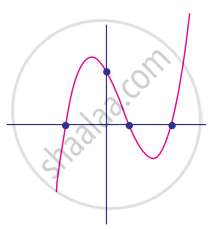Advertisements
Advertisements
Question
If a, b, c are all non-zero and a + b + c = 0, prove that `a^2/(bc) + b^2/(ca) + c^2/(ab) = 3`.
Solution
To prove, `a^2/(bc) + b^2/(ca) + c^2/(ab) = 3`
We know that, a3 + b3 + c3 – 3abc = (a + b + c)(a2 + b2 + c2 – ab – bc – ca)
= 0(a2 + b2 + c2 – ab – bc – ca) ...[∵ a + b + c = 0, given]
= 0
⇒ a3 + b3 + c3 = 3abc
On dividing both sides by abc, we get
`a^3/(abc) + b^3/(abc) + c^3/(abc) = 3`
⇒ `a^2/(bc) + b^2/(ac) + c^2/(ab) = 3`
Hence proved.
APPEARS IN
RELATED QUESTIONS
Find p(0), p(1) and p(2) for the following polynomial:-
p(x) = x3
Verify whether the following zeroes of the polynomial, indicated against them.
p(x) = x2 – 1, x = 1, –1
Verify whether the following zeroes of the polynomial, indicated against them.
p(x) = (x + 1) (x – 2), x = – 1, 2
Verify whether the following zeroes of the polynomial, indicated against them.
p(x) = x2, x = 0
Verify whether the following zeroes of the polynomial, indicated against them.
p(x) = 2x + 1, `x = 1/2`
Find the zero of the polynomial in the following case:
p(x) = 2x + 5
Verify whether the indicated numbers is zeroes of the polynomials corresponding to them in the following case:
`f ( x ) = 5x - pi , x = 4/5`
Verify whether the indicated numbers is zeroes of the polynomials corresponding to them in the following case:
`f (x) = 2x +1, x = 1/2`
Find the number of zeros of the following polynomial represented by their graph

–3 is a zero of x – 3
